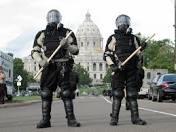Prosecutors need more tools to hold law enforcement officers accountable when they violate someone’s civil rights through excessive force, a Georgia congressman said this week about a Tribune-Review investigation.
Rep. Hank Johnson, a member of the House Judiciary Committee, said he has proposed two bills: one allowing federal prosecutors to charge officers with murder and manslaughter and another that would encourage local authorities to appoint independent prosecutors whenever police kill someone in the line of duty.
An ongoing Trib investigative series, based on Department of Justice data, found federal prosecutors declined to charge police with civil rights violations 96 percent of the time during the last two decades.
Among the reasons cited by prosecutors and legal experts were an 1866 law and a 1945 Supreme Court ruling that require prosecutors to show officers “willfully” violated someone’s civil rights.
“I’m disheartened by that (96 percent) number, and it does speak to … the limitations of a violation-of-civil-rights charge being the only charge that could be levied in an excessive use of force case against a police officer,” Johnson said. “It demonstrates the need for an additional tool in the tool box.”
Other officials and legal experts also have called for changes to federal law since the Trib reported its findings.
The head of the nation’s largest police union defended the current law, however, saying officers have a difficult job and need extra protection.
Law enforcement officers never have been under more scrutiny, which has hurt recruiting and morale, said Jim Pasco, executive director of the national Fraternal Order of Police in Washington.
“From our perspective, you find that you’ve got a law that was passed by Congress and you don’t feel that you’re convicting enough people with that law, so that means you should lower the bar for prosecution?” Pasco said.
“If the crime is there, then the case ought to be made; and if the crime’s not there, then the case shouldn’t be made.”
A spokesman for the American Civil Liberties Union had a similar response.
“Willfulness is a very high standard,” said Jeff Robinson, director of the ACLU’s Center for Justice, adding that he’s not sure the law should be changed since it’s similar to the standard for first-degree murder.
“Premeditated intent to kill is also a very high standard,” he said. “They prove that all the time.”
Congress enacted the section of civil rights law involving law enforcement — Title 18, Section 242 — in 1866, just after the Civil War. The Supreme Court created a higher standard for enforcing the law by ruling in 1945 that prosecutors must prove that officers acted “willfully” to deprive someone of their civil rights.”
The court also ruled in the 1989 case of Graham v. Connor that a police officer’s actions must be “judged from the perspective of a reasonable officer on the scene, rather than with the 20/20 vision of hindsight.”
Even if government lawyers show that a police officer used excessive force, they must prove that he or she intended to harm the person, legal experts said.
That can be a high hurdle in rapidly changing police actions, David Hickton, the U.S. Attorney for the Western District of Pennsylvania, told the Trib.
Prosecutors in the 94 federal district offices must obtain approval from the Justice Department in Washington to prosecute incidents involving deaths or national notoriety. They cannot tread into cases in which state or local prosecutors have brought charges.
“I thought (the law) needed to be updated,” Hickton said this week on a WESA 90.5-FM radio interview with two Trib reporters about the newspaper’s investigation. “If people want to understand why we sometimes can’t bring a case when it seems that we should, this is the reason why.”
The deeply divided Congress has given little traction to either bill introduced by Johnson, a Democrat from DeKalb County in suburban Atlanta. Police unions have lobbied against the measures, he said, and no Republicans have signed on as co-sponsors.
Johnson’s proposed Grand Jury Reform Act would withhold federal funding from any law enforcement agency that fails to comply with having a special prosecutor appointed to investigate police-involved deaths. It has 31 Democratic co-sponsors.
His other bill, the Police Accountability Act, which would make murder and assault by police officers a federal crime, has just 16 co-sponsors.
“If there is no accountability, then you get excessive use of force,” Johnson said. “There’s got to be some kind of accountability process in place that encourages and incentivizes good conduct and does not turn the blind eye to misconduct.”
The proposed Police Accountability Act could be unconstitutional because Congress can’t just make anything a federal crime, said Wesley Oliver, a Duquesne University law professor who studies the criminal justice system.
The federal prosecution of police for civil rights violations is authorized by the 14th Amendment, which bans states from depriving any person of life, liberty or property without due process of law.
To work, the law would have to address an unjustified killing by a police officer during the performance of his duties, Oliver said.
“If an off-duty police officer has a vendetta with his brother-in-law, it would not cover that,” he said.
As for civil rights violations by police, Oliver said he thinks “a better statute could certainly be drafted. It’s the interpretation that’s more of the problem than the current law.
“We are looking at that split-second when the officer decides to shoot and, in that split-second, it could go either way.” Oliver said.
Prosecutors should instead look at the decisions that led to that moment, he said. “We aren’t doing enough to encourage police to de-escalate situations.”
Andrew Conte is a member of the Tribune-Review investigations team. Reach him at 412-320-7835 or andrewconte@tribweb.com. Brian Bowling is a Tribune-Review staff writer. Reach him at 412-325-4301 or bbowling@tribweb.com.
http://triblive.com/news/editorspicks/10143083-74/police-law-prosecutors


